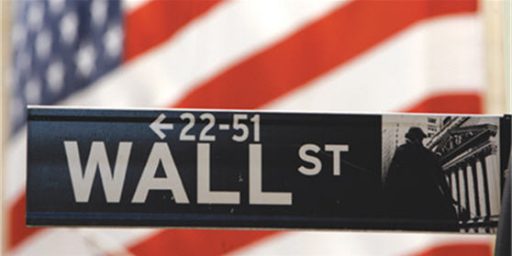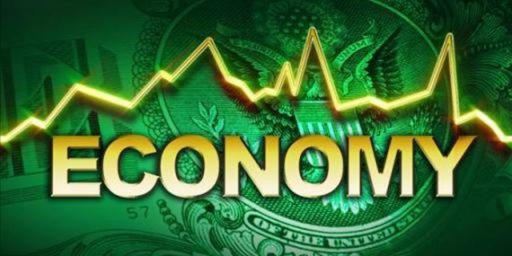Inflation and Interest Rates
This post is related to James’ post about gasoline prices in that it looks like the Fed may have stopped raising interest rates at just the right time. The reason for this is that many of the key drivers for inflation seem to be heading south in terms of their prices. James Hamilton has a very good post on this that points to a wide array of evidence that fears of accelerating inflation are probably unjustified.
Prof. Hamilton points not only to the price of oil, but also the Gold, copper, zinc, aluminum as well as the yield on the 10-year Treasury Inflation-Protected Security (TIPS). All of these are trending down and hence point to lower inflation down the road. Why? The coming economic slowdown.
What brought commodity prices and long-term nominal yields down is the same thing that induced the Fed to pause, namely, the recognition that the magnitude of the incipient economic slowdown is more significant than many were anticipating a few months ago. To be sure, many other factors influence the price of any given commodity, and some commodities, such as silver, lead, and nickel, are up rather than down over the last two months. But other things equal, slower growth of real economic activity is bearish for any commodity, and as the reality of the slowdown has sunk in, commodity prices have responded, one by one.
There is also this article that looks primarily at the head of the Richmond Federal Reserve Bank, Jeffery Lacker, who is still hawkish on inflation. However, about a third of the way into the article we get this tidbit,
At the Aug. 8 meeting, the FOMC heard staff economists explain that they cut their economic-growth forecast for the second half of 2006 and 2007 mainly because of recent revisions to gross domestic product in prior years. The minutes don’t give specific numbers for the prediction.
“There wasn’t a substantial difference between me and the staff on their forecast for real growth,” Lacker said. “I just don’t think that growth by itself is going to take inflation down.”
The U.S. economy expanded at a 2.9 percent annual pace in the second quarter, the Commerce Department said today, revising the initial 2.5 percent gain reported in July. That compares with a 5.6 percent rate in the first quarter. The FOMC last month predicted 2006 economic growth of 3.25 percent to 3.5 percent and, in 2007, 3 percent to 3.25 percent.
Add in the slump in the housing market and personal consumption might start to decline in the coming months as well.
Overall, it looks like interest rates might not resume their upward march which would also be a good thing for Bush. As James’ notes, the most likely candidates for this nefarious development is Bush-Rove-Halliburton.




Over the last 20 years the price of copper has a 0.97 correlation with the price of oil this month and a 0.93 correlation with next month’s price of oil.
Both prices seem to be driven largely by world economic growth.
The Fed regularly links control of inflation as one concern in regulating money supply. Investment gurus like Marting Zweig and Peter Lynch place significant emphasis on both interest rates and inflation. The impact of the bad boys from Enron, WorldCom and investment banking on Wall Street have more impact on this subject than people would like to believe.
What I can’t understand in all the discussions of the state of the economy, even discounting political rhetoric, is why no one focuses on the leading market indexes or indices as being historically flat for the past five years. 11000 on the Dow was reached five years ago or so and we’re still dangling around that number. Even though a market index is merely an adjusted representation of the health of a selected number of stocks and the index components change, there is still a psychological effect on the market that is very real. If not a trigger for market movement up or down than why do we obsess about its value so much?
I contend that we never surfaced from the last economic dive and are floundering to find a true course and as such will probably continue to wandeer aimlessly until resolution on some matters is sufficient to cause some serious sustained economic growth.